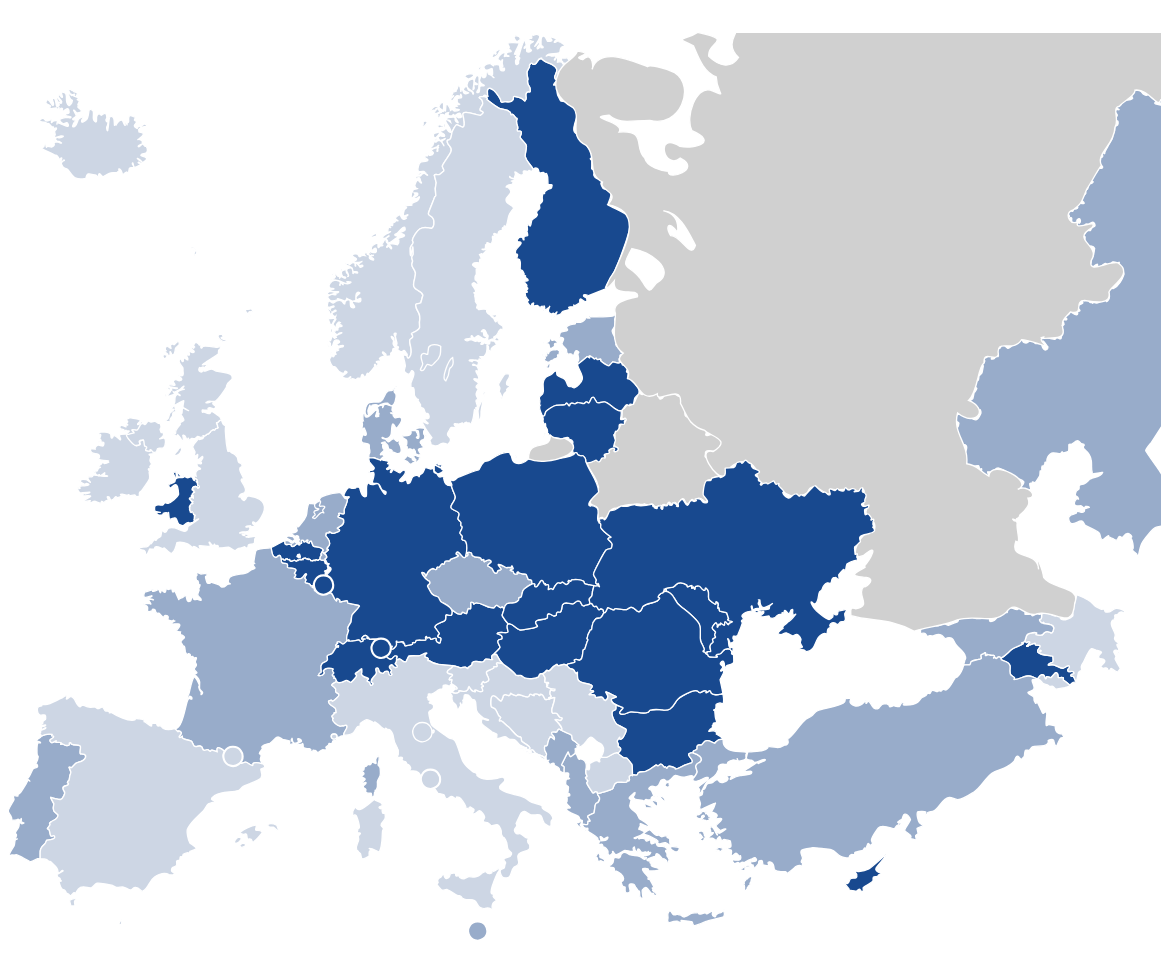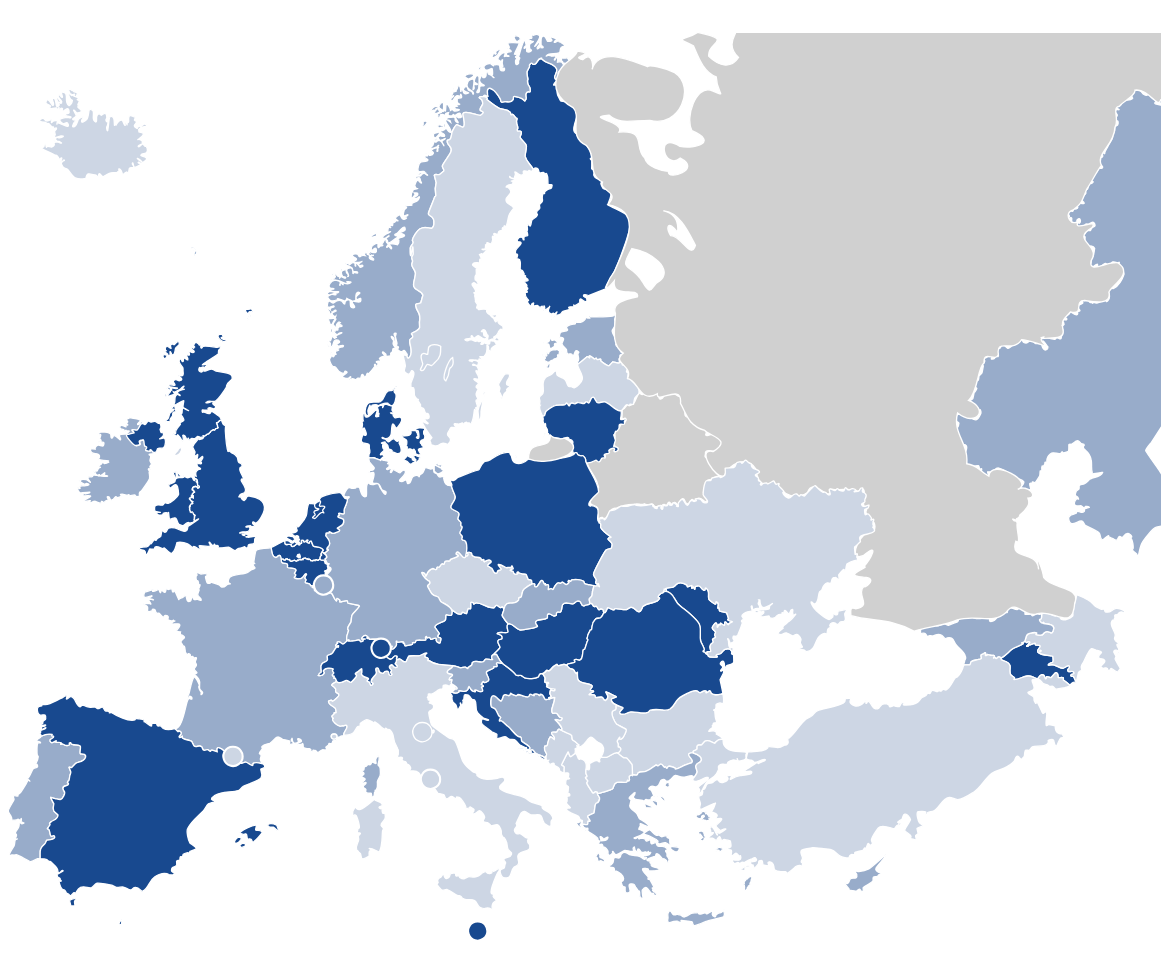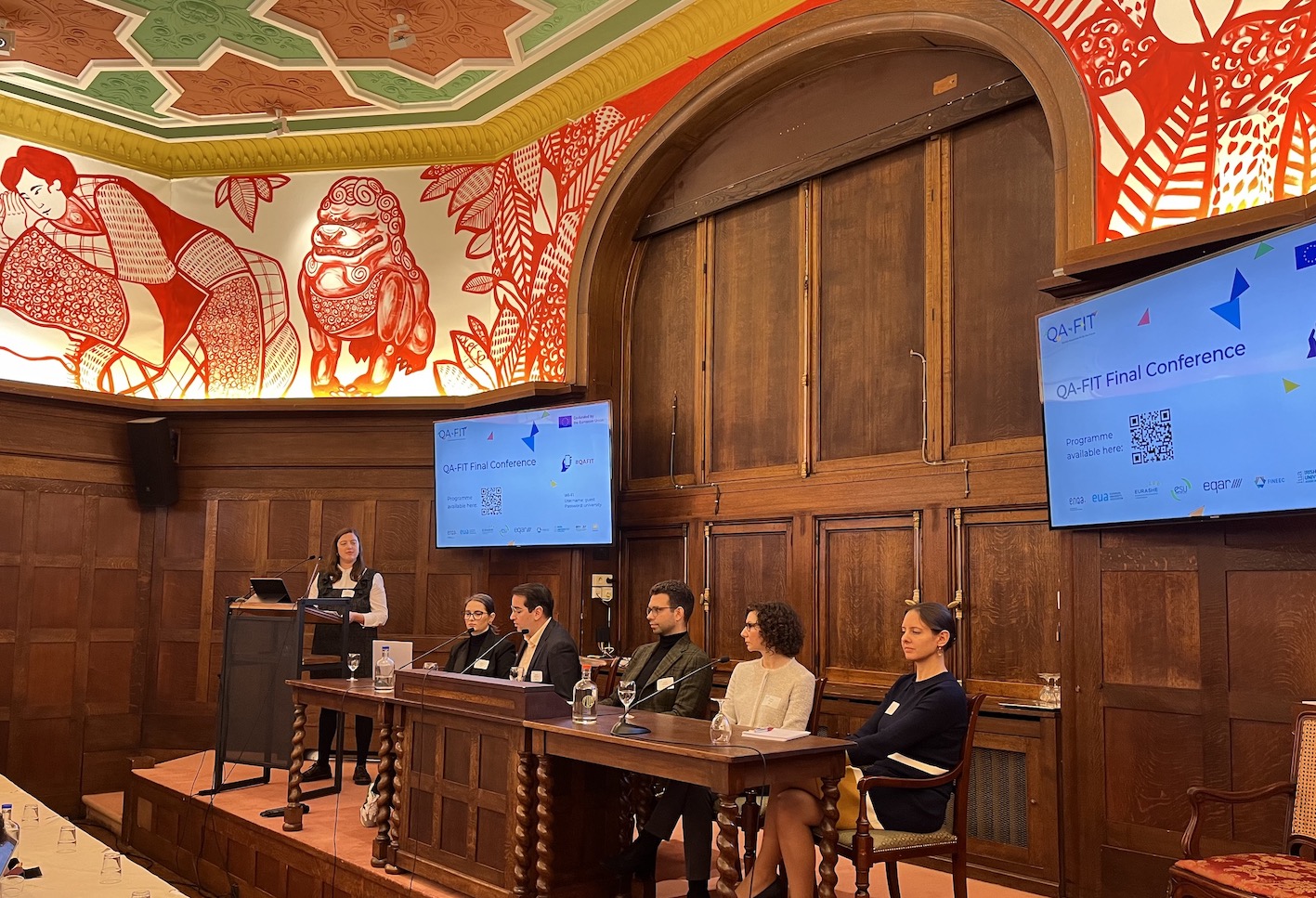Contributing to the Development of the EHEA
ESG Revison
Based on the mandate given by the Tirana Ministerial Communiqué of May 2024, the process of revision of the Standards and Guidelines for Quality Assurance in the European Higher Education Area (ESG) started in September 2024. The revision process is coordinated by the Steering Committee, composed of representatives of seven organisations active in the field of higher education: EQAR, European Association for Quality Assurance in Higher Education (ENQA), European Students’ Union (ESU), European University Association (EUA), European Association of Institutions in Higher Education (EURASHE), BUSINESSEUROPE, and Education International.
So far, the Steering Committee has held two meetings in which the overall framework and timeline of the ESG revision were discussed. Initial progress has also been made on the general and introductory part of the ESG text. The revision itself draws on extensive stakeholder consultations conducted over the past few years within the framework of the QA-FIT project (link), in which EQAR also participated as one of the project partners. The process is expected to be completed in spring 2027, when the draft of the revised ESG will be presented to EHEA Ministers for adoption at the Ministerial Conference.
Contribution to the EHEA Work Plan and projects
EQAR contributes to the European Higher Education Area (EHEA) working structures as well as to other relevant European policy developments following closely its plan of work.
In 2024, EQAR supported the implementation of EHEA reforms in the meetings of the Bologna Follow-up Group and its working structures (Thematic Peer Group on QA, Thematic Peer Group on Recognition, Working Group 1 on Monitoring the Implementation). As part of the BFUG Monitoring Working Group (WG1), EQAR contributed to the discussion on the final draft of the Implementation Report. In the meetings of the Thematic Peer Group on Quality Assurance (TPG C), EQAR contributed to the discussions on legal frameworks aligned with the ESG, cross-border QA and the European Approach, while in the meetings of the Thematic Peer Group on Recognition (TPG B) EQAR supported the discussions on digitalisation of recognition processes and the implementation of LRC principles.
Through its involvement in various projects (see also Projects below) and events, EQAR fed its expertise into relevant discussions and initiatives related to quality assurance (e.g. the proposal of a European Degree label, the possible European Approach for QA of European University alliances, the possible revision of the EU Recommendation on Quality Assurance, the European Higher Education Sector Observatory), amongst others through the EEA Higher Education Working Group and the ETER Advisory Board.
In 2024, EQAR continued to monitor developments in external QA at system level across the EHEA and to maintain the Knowledge Base of national/regional frameworks for external quality assurance through the QA FIT project survey of national ministries (see more about QA FIT here).
In the wake of the Tirana Ministerial Conference, EQAR prepared a statement to the conference calling upon ministers to fully implement the agreed European quality assurance framework and to dismantle remaining obstacles in cross-border recognition. Furthermore EQAR called upon ministers to reaffirm the automatic recognition of qualifications as a key aim of the Bologna Process to boost the mobility of students and staff, based on the robust European quality assurance infrastructure established by the ESG, EQAR and DEQAR, and to promote the use of DEQAR as well as encourage the publication of external quality assurance reports in DEQAR.
In the second half of 2024, EQAR continued its active contribution in the new working structures in EHEA. In the new working cycle EQAR will continue its participation in WG 1 Monitoring and Implementation, TPG B Recognition, TPG C Quality Assurance and also join the Task Force on the Long Term secretariat of the EHEA.
Apart from that, EQAR was also active in various task-force and peer-learning activities on digitalisation, the Diploma Supplement and micro credentials.
EQAR continued its work on integrating DEQAR data in the European Digital Credentials for Learning ecosystem. HEIs that have their reports in DEQAR can now automatically issue external QA results as EBSI-compatible Verifiable Credentials (VC). EQAR has further improved the interface to export/transfer DEQAR data to the Europass Qualifications Dataset Register (QDR).
Openness to cross-border external QA with an EQAR-registered agency
In 2024 the availability of cross-border external quality assurance (QA) with an EQAR-registered agency remained unchanged from the previous years. Higher education institutions in 21 higher education systems in EHEA (shown on the map as dark blue) are eligible for cross-border QA, while 13 other (shown as medium dark blue) allow recognition of procedures with EQAR-registered agencies under certain conditions. DEQAR data also show that in 2024 there was a decrease in the number of CBQA results comparing with 2023, however at the time of writing the report some agencies are in the process of publishing reports for 2024 and these number will change.
Despite the slow pace of development in legal frameworks on the openness to cross-border QA, we see that some countries are working towards opening their systems to cross-border QA in the coming years.
More information on the cross-border external QA activities of EQAR-registered agencies can be consulted on our website here.

Use of the European Approach for Quality Assurance of Joint Programmes
In 2024, the European Approach for Quality Assurance of Joint Programmes (EA) was available to higher education institutions in 21 higher education systems (map: dark blue); in six of those the European Approach is available by virtue of external quality assurance being required at institutional level only.
Despite frequent policy discussions highlighting the importance of the European Approach in the context of the European Universities initiative, there was little progress compared to 2023.
In 14 EHEA systems, the European Approach was only available to some higher education institutions or subject to specific, additional conditions (map: light blue). The map below gives an overview, the information on each country provides further details, such as an explanation of a specific legislation or the fact that higher education institutions themselves are responsible for the quality assurance of their programmes. In 16 EHEA systems, higher education institutions remain unable to use the European Approach as of 2023, creating an additional burden for those institutions when engaging in international cooperation.

EQAR has maintained a specific page on its website with a list of example cases where the European Approach was used, to allow others to draw from these experiences. Until the end of 2024, 69 external quality assurance procedures had been completed in line with the European Approach based on information available in DEQAR. This is almost twice as many as by the end of 2023, (32 reports). This increase could be connected to a general increase in these procedures in 2024 but also by the fact that one EQAR-registered agency started uploading their external review reports only as of 2024. The table below shows the agencies that have carried out those reviews. These procedures cover 31 EHEA systems (see map below).
| Agency | Number of reports |
|---|---|
| ACCUA | 1 |
| ACSUCYL | 2 |
| AQ Austria | 3 |
| AQAS | 15 |
| AQU | 7 |
| ASHE | 1 |
| HCERES | 3 |
| NVAO | 30 |
| Unibasq | 3 |
| VLUHR QA | 2 |
| ZEvA | 3 |
NB: For practical reasons, EQAR is unable to keep track of European Approach reviews that have not been added to DEQAR. Some institutions have contacted EQAR regarding their European Approach accreditation not showing up in the list, EQAR has encouraged the respective agency to upload those reports manually even if it unable to upload its other external QA reports to DEQAR at this stage.
The numbers above also do not include any institutions that might have used the European Approach in their internal QA arrangements, e.g. in cases where no external programme accreditation/review is required, as there is no reporting on such cases.
-
European Approach
IMINQA project
The IMINQA project – Implementation and Innovation in QA through Peer Learning – is an umbrella project that supports the work of the Bologna Thematic Peer Group C on Quality Assurance, focusing on the implementation of the key commitment on quality assurance in all EHEA countries. The project includes several activities, such as the Staff Mobility programme, Peer Learning Activities (PLA’s) and the Working Group on the QA of Micro-credentials.
Working Group on the QA of Micro-credentials
One of the aims was to develop a data model for other (previously “alternative”) providers and micro credentials in DEQAR. Preparatory work had already been carried out in 2023; the mock-up of a data model for other providers and micro credentials, the incorporation of feedback thereof and the testing of the new system. The new system was finally launched at the end of April 2024, when EQAR presented the expansion in DEQAR featuring data on external QA of micro-credentials and other providers, as well as the DEQAR data model at an IMINQA Working Group meeting.
Additionally, during the course of 2024, EQAR carried out a mapping exercise and analysis of ESG-aligned QA labels in higher education and the perception of QA agencies towards implementing such labels. The results were then documented and further developed by EQAR in the report “Feasibility assessment on the establishment of quality label for all providers that operate in alignment with the European Approach to Micro-Credentials for Lifelong Learning and Employability”, published in December 2024. The study aims to explore the viability of a quality label for providers working in alignment with the principles outlined in the European Approach to Micro-Credentials for Lifelong Learning and Employability, and explores its added value as well as the potential models of implementation.
Staff mobility programme
The staff mobility programme of the IMINQA project was concluded in May 2024. EQAR formed part of the IMINQA Matchmaking Committee. During the last call there were almost 30 mobility visits/exchanges. The top five main topics of the recent staff mobility visits were:
- Enhancement-oriented use of the ESG
- Stakeholder engagement, European Approach for QA of Joint Programmes, digitalisation of QA processes
- Cross-border QA
- Internal QA
- Legislative framework in line with the ESG
Peer Learning Activities (PLAs)
Since the start of the project in May 2022, three Peer Learning Activities (PLAs) were organised by EQAR on EHEA policy priorities in quality assurance, all three resulting in a thematic analysis:
- Aligning the legal framework with the ESG (i.e. EHEA key commitment)
- Cross-border QA (CBQA) and QA of transnational education (TNE)
- European Approach for QA of Joint Programmes.
The latest thematic analysis, also written by EQAR, on the implementation of the European Approach for Quality Assurance of Joint Programmes (further: the European Approach) was published in November 2024. The analysis offers an overview of the status quo in 2023 of the implementation efforts regarding the European Approach. The analysis also delves into the various national and institutional challenges as well as the complexities and opportunities associated with implementing the European Approach across the diverse national and institutional contexts in the European Higher Education Area.
⇒ Thematic analysis on the implementation of the European Approach for QA of Joint Programmes
⇒ Feasibility assessment on the establishment of quality label for all providers that operate in alignment with the European Approach to Micro-Credentials for Lifelong Learning and Employability
⇒ More about IMINQA
QA-FIT project
The Quality Assurance Fit for the Future (QA-FIT) project, led by ENQA, aimed to gather comprehensive evidence and reflect if and how the current EHEA framework of the ESG is perceived to limit the responsiveness of quality assurance to trends and innovations in higher education. The project started in 2022 and drew to a close at the end of 2024.
QA-FIT started with a mapping exercise to collect evidence on the scope and implementation of quality assurance policies and practices. This was done by means of surveys for all stakeholder groups (ministries, higher education institutions, national student unions and quality assurance agencies) which were sent out in 2022 and were collected and analysed. EQAR was responsible for the surveys for the ministries of higher education, which then lead to the publication of the “Analysis of Ministry Survey Responses” and the The QA-FIT Focus Group for ministries, both in 2023.
The year 2024 was the last year of the QA-fit project and with the end of the project in sight, two final events were organised and a final publication prepared, showcasing the most pressing questions and issues that had been gathered through the project “how have the ESG been adapted to different contexts?”, “how have quality assurance activities addressed the recent and emerging developments in higher education?” and “what are the perspectives on the future of quality assurance in the EHEA”?
EQAR co-organised, participated in and attended both the QA FIT webinar (on 10 September) and the QA-FIT Final Conference, which took place in Brussels on 7 November. The latter event concluded the project. Apart from various presentations showcasing the project activities and main outcomes, there were various discussions on quality assurance, the ESG and the way forward. The final project paper “Quality assurance fit for the future – Key considerations for the revision of the ESG” was presented and disseminated.
This paper, based on the main conclusions drawn from the collected data and consultations with stakeholders, reflects on some key considerations that the authors of the ESG should keep in mind during the revision process in order to support its continued acceptance and success and to help avoid unintended consequences that could arise from new or updated elements.
⇒ Read more about and download the final paper
⇒ More about QA FIT

TPG-LRC CoRE project
The TPG-LRC Constructing Recognition in the EHEA (TPG-LRC CoRE) project is led by CIMEA and aims to support the work of the Thematic Peer Group B on the Lisbon Recognition Convention focusing on key commitment 2: national legislation and procedures compliant with the Lisbon Recognition Convention.
The main project activities involve panel discussions and peer learning activities on common challenges (i.e. recognition of knowledge gained through alternative pathways, micro credentials, digitalisation of recognition workflows, European Degree etc.) and research that will further enable peer learning.
EQAR, among others, contributes to the working group of quality assurance of recognition (along with EUA, ESU, Nuffic, HARNO and CIMEA), exploring the quality of recognition processes. As part of the working group, EQAR collaborated with an independent researcher and made a qualitative analysis using DEQAR reports. This research dwells deeper into the work of 11 of EQAR’s registered agencies and provides insight in the coverage of ESG 1.4, with a focus on recognition. The (condensed) analysis, part of a publication on quality of recognition “Ensuring and enhancing the quality of recognition processes – Key considerations and recommendations” was published in July 2024.
Additionally, EQAR is leading the working group on digitalisation of recognition tools.
Two of the aims of this group were completed in 2023: the organisation of three peer learning webinars and the organisation of two workshops on digitalisation of the diploma supplement and the connection to the European Learning Model (i.e. standards). The third objective, to publish a guide on “Digitalisation of Recognition Tools” is set for the beginning of 2025.